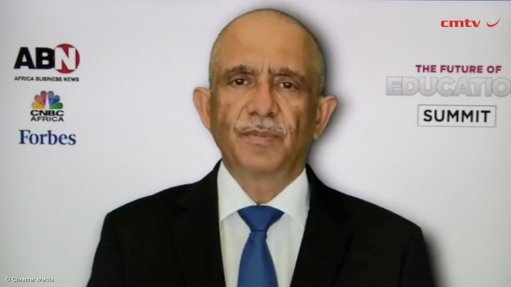
Rakesh Wahi
The Covid-19 pandemic has acted a catalyst for a future of blended learning in Africa; however, it has also highlighted a number of challenges that this learning model poses for the continent, which must first be dealt with, Future of Education Summit founder Rakesh Wahi said on November 26.
He said student mobility, where many students migrated to western countries for education, had been reduced by almost 20% in the new academic year in September, and those institutions relying on international students had been severely impacted.
Wahi said there must be a concerted effort to reconsider globalisation models and a trend towards localisation of education, through collaboration.
He noted that the costs of education had not reduced with the growing move to online learning since the pandemic started; rather, costs had increased owing to the costs of adapting to online learning.
Costs are expected to continue increasing as education is likely to continue to have a dual delivery.
Moreover, with the pandemic leading to reduced student capacity, this has resulted in educational institutions having to implement budget cuts.
On the continent, he mentioned infrastructure challenges, such as broadband connectivity and laptop availability, a well as cost, as some of the biggest constraints.
Wahi said there were many practical impediments to online learning in Africa, especially in the short term.
Moreover, he said many African countries did not have student loan capacity, therefore, parents or guardians had to pay for students' education.
However, with the worsening economics owing to the pandemic, this has resulted in many pulling their wards out of education. Wahi said this would lead to a delay in students entering the workforce and, therefore, highlighted the need for access to student loans.
Wahi also noted that, on the demand side, students wanted to move faster into the workforce, and there needed to be a change towards more skills-based training and providing the skills required by employees.
Further, he also noted that the regulatory environment needed to be overhauled, to ensure it could account for regulating the education models of the future.
Tackling all of these issues would require vision and creativity that embraced the changing paradigm of education, as well as collaboration, Wahi said.
In terms of collaboration, PwC Africa CEO Dion Shango spoke about the company’s work with the United Nations Children's Fund (Unicef) in helping to prepare young people with relevant skills to enter the workforce.
This is part of a three-year global collaboration between PwC and Unicef in support of Generation Unlimited, a multi-sector partnership aimed at helping 1.8-billion young people transition from school to work by 2030.
This collaboration is aimed at supporting young people who are currently outside of the workforce to develop the requisite twenty-first-century skills to gain entry into the job market and to become entrepreneurs in the age of the Fourth Industrial Revolution.